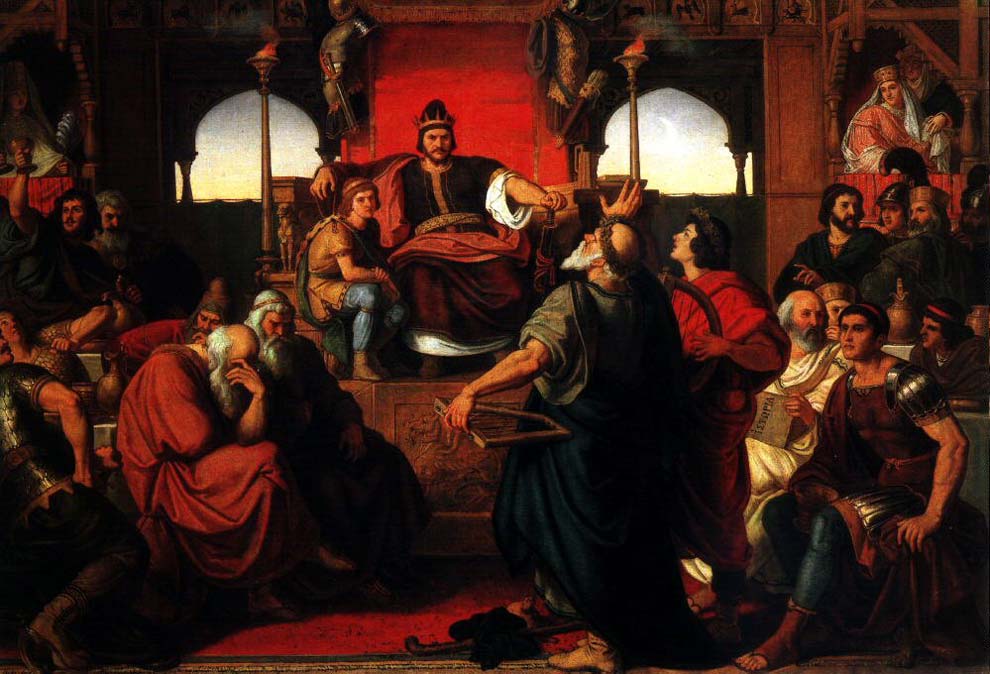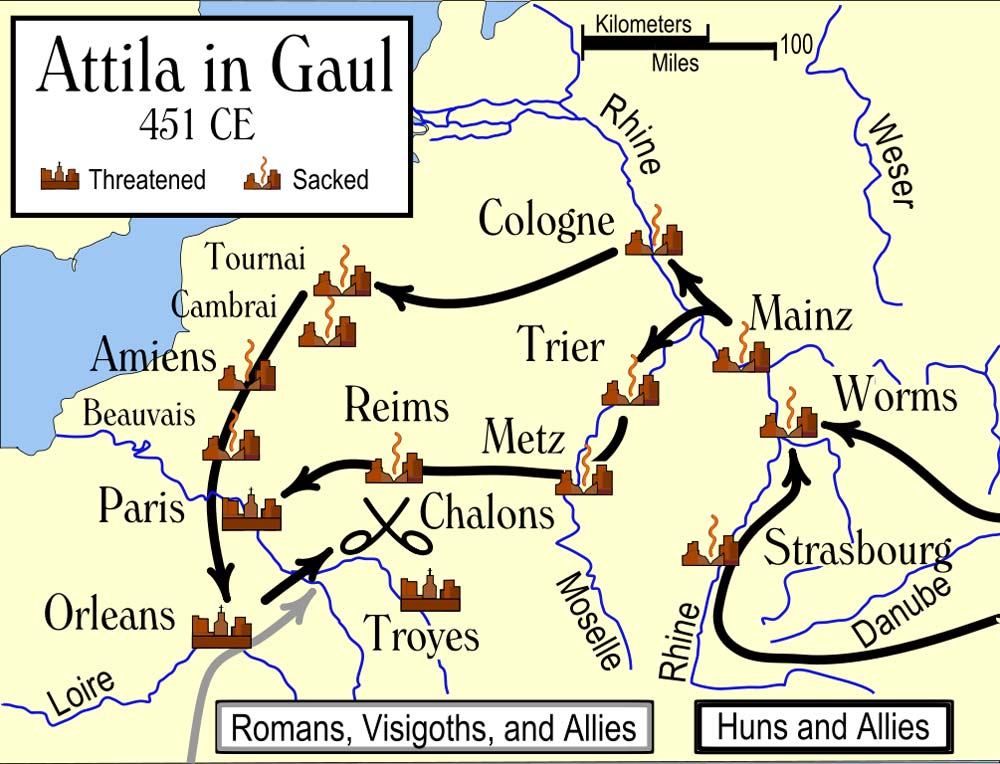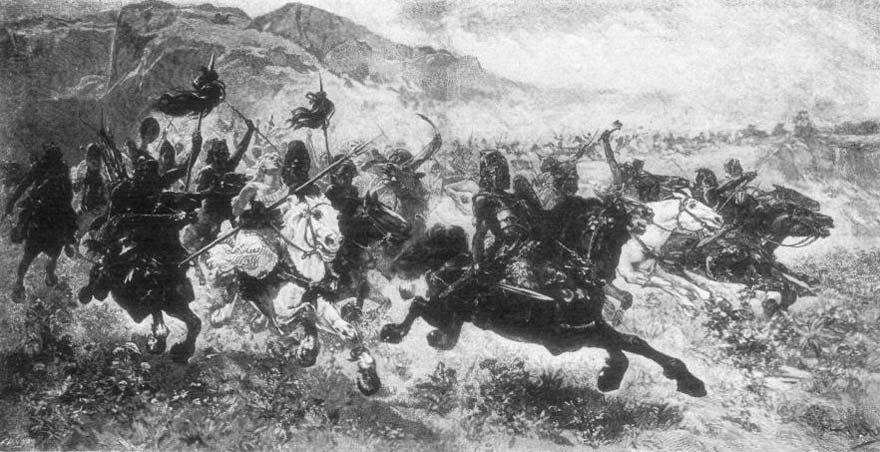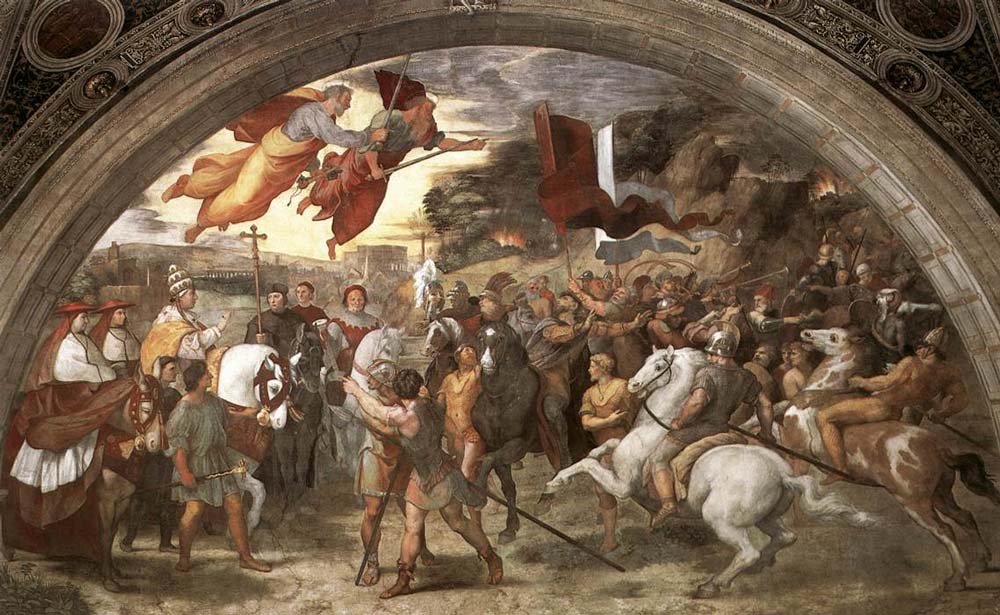| Attila | |
|---|---|
 |
|
| King of the Huns | |
| In Power | 434–453 |
| Born | c.406 |
| Died | 453 |
Attila (c.406-453) is one of the most well-known military leaders of his time, and still a very well-known leader today. He worked to unite the Hun Kingdom, bring its people together, and help create one of the strongest military fronts and armies of his time. He was able to do so with limited military experience and a limited army of men and militia to fight the battles with other warring nations.
Acquiring a Vast Empire
 During his military leadership, Attila led his army through several conquests. At each battle front he and his men took on, they pillaged and looted in order to acquire the necessities to continue warring. While he led the Huns through their many conquests, he managed to expand the empire and helped to unite a broken front along the way.
During his military leadership, Attila led his army through several conquests. At each battle front he and his men took on, they pillaged and looted in order to acquire the necessities to continue warring. While he led the Huns through their many conquests, he managed to expand the empire and helped to unite a broken front along the way.
The empire that he was able to build while in power went from parts of what is today considered Germany, through Russia, parts of Poland, and through a majority of the southeastern portion of Europe. Not only did he amass several victories along the way, he drew together a nation that had been torn apart and built what is still, to this day, one of the largest empire takeovers during his military reign.
Invasion the Roman Empire
 In 440 A.D., Attila initially invaded the eastern portion of Rome’s large empire, which forced the Roman Emperor of the time (Theodosius II) to enter and negotiate a peace treaty. In this treaty, an annual fee of 660 pounds of gold (which was to begin in 443 A.D.), was to be paid to the Hunnic Empire. The payments in gold, and payments that were also made in forms of land, put a temporary halt to the conquests and attacks by the Hun army. The limited attacks ended when an attempt to conquer the Persian Empire was halted on the Western front.
In 440 A.D., Attila initially invaded the eastern portion of Rome’s large empire, which forced the Roman Emperor of the time (Theodosius II) to enter and negotiate a peace treaty. In this treaty, an annual fee of 660 pounds of gold (which was to begin in 443 A.D.), was to be paid to the Hunnic Empire. The payments in gold, and payments that were also made in forms of land, put a temporary halt to the conquests and attacks by the Hun army. The limited attacks ended when an attempt to conquer the Persian Empire was halted on the Western front.
Unsuccessful Persian Campaign
Although Attila was able to build this mass empire, he had an unsuccessful run in and confrontation with the Persian Empire, which led to a second invasion of the Eastern Roman Empire in 441 A.D. His success in this campaign encouraged him and his army to continue through, and to push to the west. He was successful in this route as well. He and his men went through Germany and Austria with minimal effort, passing through the Rhine and into Gaul.
Powerful Leader
In his time, Attila and his army conquered many armies that faced them, devastating any nation that would come in his path. Attila made it a requirement that any army in his way would be large and powerful. With his large army and power that he acquired through his prowess as a leader, the armies that challenged him found it very difficult to overcome him and his forces.
Western Empire
 In 450 A.D. Attila attacked Gaul, part of the Western Empire. During the final years of his reign as leader, he focused most of his battles and military takeovers in the West. The Roman general Aetius united powers with the Visigoths in response to the invasion led by Attila. The newly-formed, larger army successfully halted the Hun army when they reached Orleans and was strong enough to defeat Attila in the battle of the Catalunian Plains.
In 450 A.D. Attila attacked Gaul, part of the Western Empire. During the final years of his reign as leader, he focused most of his battles and military takeovers in the West. The Roman general Aetius united powers with the Visigoths in response to the invasion led by Attila. The newly-formed, larger army successfully halted the Hun army when they reached Orleans and was strong enough to defeat Attila in the battle of the Catalunian Plains.
Due to the defeats he had faced against the combined Roman forces, Attila changed his movement and central focus towards Italy. Although they moved forward, and were entering Italy, Attila was quickly forced to turn his army back around towards the west, due to the epidemic in the region, he had to back away.
Military Recognition
Attila had become one of the best known leaders of his time and was one of the most powerful military leaders to be able to lead his fronts through Western Europe. During his time of power, he became known as the Scourge of God. He was given this title for the devastation that he and his military had wreaked on the Roman Empire.
After he retired as the military leader, and after having built such a large empire for the Huns, Attila died only a few short years after he left the army as the Huns’ leader. He died shortly after celebrating his marriage with Ildico (or Hildico), whom he married in 453 A.D. Although he had built such a large empire, it crumbled and fell apart a few short years after he died.